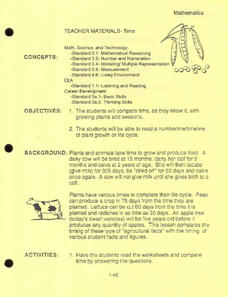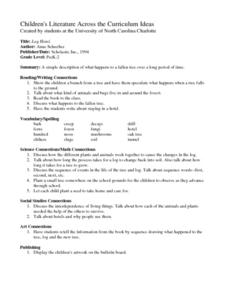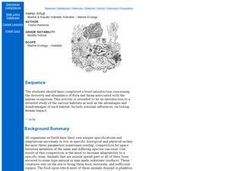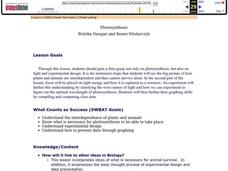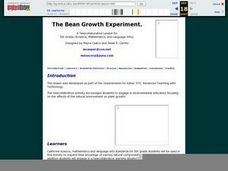Baylor College
What's Is Soil Made Of?
It's time to roll up those sleeves and get a little dirty in the second lesson of this series on the science of food. Investigate where plants and animals get the minerals they need to live in this two-part exploration of soil. First,...
Curated OER
Benefits of Indoor Plants
Students diagram a plant. In this Science lesson, students explore the concept of photosynthesis focusing on the oxygen production. Students calculate the amount of plants needed to filter the air in their classroom.
Curated OER
Time
An interesting lesson focuses the growth cycles of plants and animals. Learners look at plants like radishes, peas, and apples, and compare their growth cycles to those of dairy cows. Some very good worksheets are included in this plan...
August House
Go to Sleep, Gecko
Use this multidisciplinary instructional activity to delve into these subjects: English language arts, math, science, drama, and character education. After reading, discussing, and making interpretations about Go To Sleep, Gecko!: A...
PreKinders
Colors of Nature
The colors of nature are the most beautiful and vivid colors in the world. Show kids the ways that colors are striking and changing throughout different habitats with a set of images that feature two animals or plants for each color.
Curated OER
Log Hotel
Pupils identify how the different plants and animals work together to cause the changes in the log. Students discuss the sequence of events in the life of the tree and log. Pupils plant a seed to take home and care for. Students retell...
Curated OER
Hatchet
Students write about a time when they were in a situation where nature frightened them. They write about how Brian solved the problem of how to start a fire in the story. Students complete a short research paper on one of the plants or...
Curated OER
School Yard Park/ Ecosystem
Fifth graders examine ecosystems in their schoolyard. In this nature and ecosystem instructional activity, 5th graders map their schoolyard into workable plots. They classify plants and animals found in the plot. They revisit their site...
Curated OER
Soil Scrolls
Third graders examine soil samples and explore the what happens in each layer of the subsoil. They work in cooperative groups to create a scroll that shows what takes place in each layer, and discuss why much of the activity is in the...
Curated OER
Marine & Aquatic Habitats Activities - Marine Ecology
Learners enact the life cycle of a sessile animal and quantify the possibility of survival under the conditions given. They then present to the class a new adaptation which will increase the animals chance of survival.
California Academy of Science
How Big is Big?
In a math or life science class, "mini-me" models are created with cardstock to reflect a 1:10 scale of students' bodies. Learners measure each others' heights with meter sticks, and then reduce the size by 10. After this exercise, they...
Curated OER
Photosynthesis
Students recognize the importance of plants as they perform an experiment involving photosynthesis. Students determine the optimum wavelength of light for photosynthesis by exposing plants to different colors of light, collecting data,...
Curated OER
The Great Pollinators
Students discover the reproductive parts of a plant. In this biology lesson, students identify and categorize several different plants they dissect in class. Students record their information using a data chart.
Curated OER
The Prairie Climate
Ninth graders research the average temperature and precipitation of a prairie region to determine the type of climate it is, and how it differs from other biomes. They examine the types of adaptions animals have made to live in the...
Curated OER
Where Have All the Endangered Gone?
Students explore animals that are endangered. They choose an endangered animal that they would like to keep from becoming extinct. Students create a persuasive presentation to persuade someone to understand why they feel keeping their...
Curated OER
The Bean Growth Experiment
Fifth graders use modern technologies which allow them to gain a new, dynamic, and intersting understanding of themselves, their community, and the world. They focus on environmental education and the effect of the environment on plant...
University of Colorado
Punnett Squares with Piebald Deer
Explore the science behind Earth's amazing diversity of life with this instructional activity on genetics. Looking at specific traits in piebald deer, carnations, and roan cattle, young scientists use Punnett...
Curated OER
How Many Animals?
Students use their math skills to develop estimates for the population of several animal species native to the Austrailian rainforest. It is a simulation that researchers at the Center for Rainforest Studies in Australia perform to...
Curated OER
Striking a Balance
Students participate in an activity that demonstrates the principles and dynamics of food chains. They discover that the sun's energy is captured by individual plants and transferred to animals.
Curated OER
Water Regulation
Students use their basic knowledge of physiology to analyze graphical data of paramecia under diverse conditions. From the data analysis, Students develop explanations of the animal's response to the concentration of different solutions...
Curated OER
Managing Nutrients in Livestock Manure
Livestock managers reinforce math and science skills while learning about the nutrients found in manure. They predict which animal produces the largest amount and which animal's manure contains the most nitrogen. Finally, they compare...
New Mexico State University
Agrinautica
Individuals play a computer game to terraform planets. Learners add plants, animals, fungi, and minerals to the planet surface by creating numerical expressions that represent the objects. After playing the game for a while, the class...
Curated OER
Prairie Adaptations
Twelfth graders consider the survival of prairie plants. They examine how some tallgrass prairie species are adapted to the conditions of their ecosystem. They make a prediction of how a species might change given new conditions.
Curated OER
Carrying Capacity of Ecosystems
Students define population and carrying. In this algebra lesson, students explore exponential growth and decay based on animals and things that grow or decrease exponentially. They graph their findings and discuss their results as they...
Other popular searches
- Arctic Plants and Animals
- Aquatic Plants and Animals
- Coastal Plants and Animals
- Artic Plants and Animals
- Plants and Animals Needs
- Animals and Plants
- Plants and Animals Interact
- Desert Plants and Animals
- Plants and Animals Die
- Attic Plants and Animals
- Comparing Plants and Animals
- Animals Plants and Water


